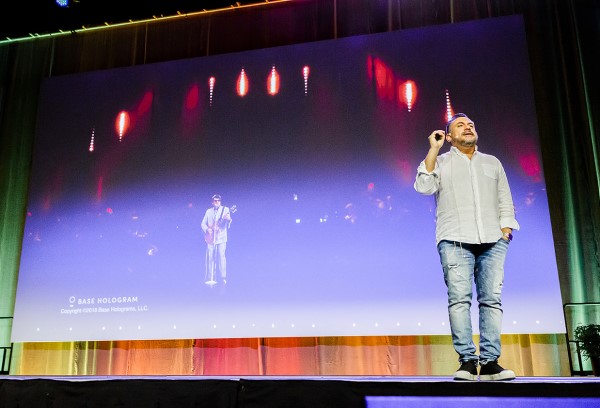
Watch Leonard Brody’s keynote through the 2019 ICMA Annual Conference Archives.
Conference participants started the day on Monday diving into a heavy topic: the future of humanity’s use of technology. In this engaging and eye-opening discussion of “the Great Rewrite,” keynote speaker Leonard Brody asked the audience to check their historical biases and be open minded about how the future of technology will change the way municipalities serve their communities. Brody, recognizes as one of the top 30 management thinkers in the world, has been called a “controversial leaders of the new world order.”
Brody explained that he has always been about business, but more importantly, he has been interested in human behavior. As an award-winning entrepreneur, venture capitalist, best-selling author and a two-time Emmy nominated media visionary, Brody used his array of experience to create a framework for this time in history, which he refers to as “the Great Rewrite,” a time of complete reset of our world operating system from the ground up.
The Great Rewrite
According to Brody, the evolution of humanity is important for cities and towns to consider. Statistics such as “life expectancy is two and a half times longer than 100 years ago,” and “access to education is at 86 percent, compared to 17 percent in 1900,” show us how quickly things can change in 100 years. However, after the industrial revolution, many aspects of human life have changed more drastically in shorter amount of times. In the span of two decades from 1900-1920, most normal aspects of our lives, such as packaged goods, retirement, and homeownership, were created and became a regular aspect of human existence.
Brody uses the institution of marriage as an example. Today, two-thirds of marriages will start online, with a 20 percent lower chance of divorce. We are engaging in this medium of marriage in a way that was never done before as short as 30 years ago. Brody concludes, “We have rewritten marriage in a matter of 3 decades.”
There is a caution to this discussion of historical changes in human existence. Brody explained the concept of false historical bias – believing that an aspect of our history is correct based on our perceptions of the past and not on the reality. Brody uses the automotive sector as an example. Most believe that the development of the normal use of cars to transport people came about over a long period of time, but in reality, it took a little over one decade, 1900 to 1913, for combustion engines to replace horse and buggies on major roads. With this drastic change, came the creation of road paving processes, licensing process, and laws to rule the use of roads. “When we think of how these rewrites affect our cities,” explains Brody, “they happen in decade chunks, not many decades.”
The Next 730 Days
Brody explained that in the next 730 days ahead of us are the most crucial in thinking and innovating for the future, because that is typically how far forward we have control of our environment. Brody offers three examples of technology that will lead in the innovation field in the next 730 days:
Cryptocurrency: There will be a rise of this new asset class. Cryptocurrency is the idea of people believing that we do not trust money to be controlled by government and banks. Brody believes this is the more superior technology than the money we use today, and will be something to watch this year.
Beryllium Hydride: Scientists at Harvard University recreated this molecule on a quantum computer this year, which is an incredible leap forward. If this can be recreated, other molecules can be recreated, leading to major changes in fields of chemistry, medicine, and beyond.
Artificial Intelligence: It is generally understood that one day computers will think as humans think. Currently, our technology allows us to give computer enough power and information to answer a linear question 99.9 percent more accurately than a human. Brody argues that we are a decade away from the next step in artificial intelligence: machine learning.
The Role of Municipalities
Municipalities have a lot to consider when they are thinking about the role they will be play in the changing human experience. As the number of people living in cities continues to increase quickly, Brody recommends that municipalities consider being as open, accessible, affordable, and technological savvy as possible. Brody suggests four concepts for municipalities to consider in matching the needs of their residents:
- Branding your community can help it thrive
- Implementing a customer success team to walk constituents through municipal processes
- Reforming municipal elections to be open source and free for everyone to bring democracy to citizens
- Creating a new model for homes that allows for selling and leasing instead of traditional ownership to meet the needs of residents
Want more?
You can access this presentation and other ICMA 2019 Annual Conference sessions through the ICMA Virtual Annual Conference Archives. Available on demand, it’s a great way to participate in educational sessions presented by knowledgeable speakers and earn credits toward your ICMA-CM or AICP-CM without the cost of travel.
New, Reduced Membership Dues
A new, reduced dues rate is available for CAOs/ACAOs, along with additional discounts for those in smaller communities, has been implemented. Learn more and be sure to join or renew today!
